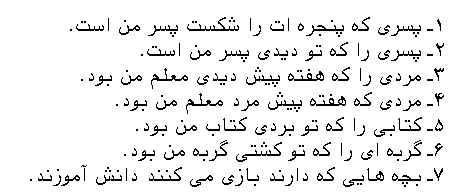New Words:
(They) are playing = ![]() /da:rænd ba:zi mi konænd/
/da:rænd ba:zi mi konænd/
Please translate the following sentences into persian:
- The boy who broke your window is my boy (son).
- The boy whom you saw is my boy (son).
- The man whom you saw last week was my teacher.
- The man who died last week was my teacher. (not me!!!)
- The book which (that) you took away was my book.
- The cat which (that) you killed was my cat.
- The children who are playing are student.
NOTE: In sentence number 6 above, we have ![]() for
for to produce /i:/ sound. As a general rule, whenever a noun ends with
/he/ (like
/gorbeh/), put
![]() at the end of it to produce /i:/ sound.
at the end of it to produce /i:/ sound.
NOTE: In sentence number 7 above, we have for
to produce /i:/ sound. As a general rule, whenever a noun ends with
/a:/ (like
/bæch.cheh ha:/), put
at the end of it to produce /i:/ sound.

A. Nick
August 18, 2013 @ 12:10 pm
Hello,
First of all, this was a hard lesson, but you explained it well! Thanks.
However I have a small problem:
last sentence (7), you wrote in English:
7.The children who are playing are student
shouldn’t the ending be something like :
danesh amuzand budand
instead of:
danesh amuzand
Or if you really mean student (in the english sentence without the ending ‘s’) and then it will be this?:
danesh amuz bud
Thanks for (any) your feedback
A. Nick
August 18, 2013 @ 1:35 pm
Instead of bud/budand, ast/hastand (as it is ‘are’ and not past tense), mistyped. but the question remains. thanks.
mohammad
August 19, 2013 @ 10:23 pm
Actually you can say like that:
danesh amuzand+danesh amuz hastand(present)
danesh amuz budand(past)
bache haee ke darand bazi mikonand,danesh amoozand
+++++
bache haee ke darand bazi mikonand,danesh amooz hastand
A. Nick
September 1, 2013 @ 8:31 pm
Thanks for your feedback.
JUN
July 21, 2015 @ 3:48 pm
maybe the sentence 7 is
the children who are playing are students(not student)
so how to translate this sentence.